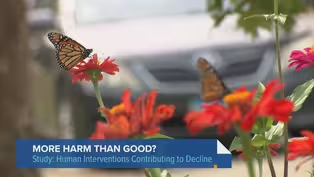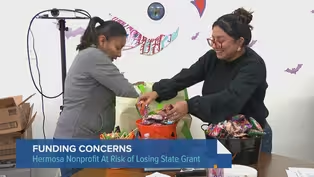Chicago Tonight: Latino Voices
Chicago Set to Overhaul Migrant Shelter System
Clip: 10/24/2024 | 8m 9sVideo has Closed Captions
One on one with Beatriz Ponce de Leon, deputy mayor of immigrant, migrant and refugee rights.
A new unified approach, known as the One System Initiative, aims to streamline services for both migrants and longtime unhoused residents.
Problems playing video? | Closed Captioning Feedback
Problems playing video? | Closed Captioning Feedback
Chicago Tonight: Latino Voices is a local public television program presented by WTTW
Chicago Tonight: Latino Voices
Chicago Set to Overhaul Migrant Shelter System
Clip: 10/24/2024 | 8m 9sVideo has Closed Captions
A new unified approach, known as the One System Initiative, aims to streamline services for both migrants and longtime unhoused residents.
Problems playing video? | Closed Captioning Feedback
How to Watch Chicago Tonight: Latino Voices
Chicago Tonight: Latino Voices is available to stream on pbs.org and the free PBS App, available on iPhone, Apple TV, Android TV, Android smartphones, Amazon Fire TV, Amazon Fire Tablet, Roku, Samsung Smart TV, and Vizio.
Providing Support for PBS.org
Learn Moreabout PBS online sponsorship>> Chicago is set to overhaul its migrant shelter system in the new year limiting beds to asylum seekers who have been in the city for less than 30 days.
The new unified approach known as the one system initiative aims to streamline services for both migrants and longtime on House residence.
But concerns linger over the potential potential overflow in the city's ability to support both populations.
Amid rising demand for shelter.
Joining us now with more is Beatrice, Ponce de Leon deputy mayor of immigrant migrant and refugee rights.
Thank you for joining us.
So let's start off.
Can you just explain the one system initiative and how it will streamline the city's approach to sheltering will rival some longtime on House residence.
thank you for having me.
Appreciate the opportunity.
>> You know, when we started the arrival shelter system, it grew very, very quickly point.
We have 15,000 people in that system and we just knew that that was not sustainable.
We also heard loud and clear from community that they were concerned about our shelter capacity for other on how Chicagoans.
And so we began to partner with the state to move towards a unified system, which is the one system initiative.
What we just announced this week is that we will be closing the new arrivals mission.
And in January that one unified shelter system will be in operation.
The way to work is that some of the beds from the new arrival system, those shelters will remain in place into the new year.
All of the policies, though, that will manage this shelter system will be the ones that the traditional shelter system has.
So there will no longer be term limits shelter, stay limits and people will still be it separated families with children adults in separate spaces over time.
The populations of, you know, new arrivals and other Chicagoans.
We'll come together.
But that transition will take some time.
>> It seems to the big initiative, you know, why is the city moving to the system?
>> Well, like I said, it is something that we've been planning for.
We knew we needed a more equitable system for years.
Chicago has only had 3,000 beds in our homeless DFS U.S. operated system.
And that was just never enough.
And so we we try to work together again with the state financial commitments for both city and state to to make this combined system.
It aligns with our new fiscal year.
So it's kind of a clean break.
But also we have budgetary constraints like the reality is that we were not able to maintain the level of capacity that we have had a given our budget across the city where we're having to look at ways that we better manage the budget or, you know, make some cuts to help us get to a balanced budget.
And this is one of those ways.
under the new system, only 3 >> 1800 beds will be made available for asylum seekers.
How does the city plan to, you know, address potential overflow, especially during those winter months?
>> We put a couple things in place to try to bring down the number of people that that will need shelter.
>> One of them is the limit to who is eligible for the first time placement.
So the very first time that people come to Chicago and asked for shelter if their asylum seekers, we will only be providing shelter for people who've been in the U.S. for 30 days or less.
Our hope is that by getting that message out and we've already started to communicate that at the border in other ways is that people make choices before they come here about knowing understanding what the limitations are.
We have had the most expansive shelter, policy and shelter system of any U.S. city to city up until now.
And I am proud of the fact that we've all come to about 50,000 people.
We have prevented all of those folks from becoming unsheltered and connected them to many, many resources in partnership with the state and others.
We have to not make a shift as we go into this new year.
>> I can imagine not everyone's happy about the shift.
Yes, it's it'll be a challenge for I can.
But the landing zone, you mentioned that that that will also be closing and which is a location where asylum seekers would arrive via bus.
Now, what would that look like if there were people to arrive?
We haven't had a bulls in Chicago since in the Chicago area since June.
>> But people do come on their own about a 3rd are coming directly from the border border states.
And so we know that there will be some folks who will still come.
And as we phase out the landing zone November.
First, the landing zone will go to instead of being overnight to 08:00AM to 08:00PM and then by December 15th, the landing zone and the state's intake center will both be closed.
We are working towards as part of the one system, new physical access point that anyone who needs shelter can go to.
And that is a collaboration, state and city to have a new place that you can go to requests shelter for whatever reason have an assortment of supports and resources to meet your specific needs.
We can't guarantee a shelter bed for everyone.
We will have 68 beds available starting in January, but people will be given the opportunity to request shelter and be, you know, if there's a space available, be placed shelter and talking about homelessness.
I mean, this is something that Chicago has talked about that advocates have talked about.
>> You know, how do you go about when advocates say, no, there's not enough spaces are shelters for people who are ready living out.
How does that work in combining everything together?
>> Well, I think the goal of this system was to have a bigger, better system for all.
And we are going from 3,000 beds to 6800 considered permanent beds.
These are guys that will now be part of Chicago's homeless services system.
What we anticipate will happen is that new arrivals?
We'll start to move out the way they have.
They now have community here at the beginning of this.
You know, people were new to the city.
There was no community.
Venezuelan Colombian community are Haitian community large enough to really help each other.
But that is different.
We now have again over 50,000 around 50,000 people and we are working with the state to connect people again through rental assistance, connecting them to other nonprofit resources, helping people in their journey for work permits, hopefully getting them to a point where they don't need to be in shelter and they can be moving out.
It will be a challenging time.
I'm not going to sugarcoat that.
And we are doing our best to support people and prevent people from becoming unsheltered.
We will need to, you know, also see in the past and people still are doing this churches and others that have stepped up to support.
And I think Chicago demonstrated at throughout this whole crisis that folks have been able to to come together.
She kind a generous.
And when you talk about, you know, a challenging time, what would you say is the biggest concern?
>> The biggest concern is that being able to provide shelter for everyone that needs it?
We are again to our best to connect people to resources.
But I think that we will see through this and hopefully in this coming year we'll have a better system.
>> That is able to serve more people and do it.
Well, linguistically culturally with wraparound supports for anyone.
>> Now there is concerns and integrating migrant shelters, shelters for longtime Chicago residents might create tension or strain resources.
How is the city addressing those concerns?
We are the have no rivals in some homeless services shelters and those shelters to figure out the right balance >> but part of the one system initiative in the recommendations that came to us from providers in the working groups is to have additional training to provide, you know, bringing in organizations that know how to work with different populations.
And I think that as that work continues, it will make it will build the capacity of our shelter system to do that.
Our chief homelessness officers in DeSoto will also be launching a plan to create a five-year plan for addressing homelessness and part of the that work will be to look at those one system recommendations and to look at
Are People Loving Monarch Butterflies to Death?
Video has Closed Captions
Clip: 10/24/2024 | 2m 36s | A new study suggests human interventions to save the insect may be doing more harm than good. (2m 36s)
Free Puppet Shows Celebrate Día de Los Muertos
Video has Closed Captions
Clip: 10/24/2024 | 2m 31s | On the Mexican holiday, people honor their loved ones who have died. (2m 31s)
Hermosa Nonprofit Says It's at Risk of Losing State Funding
Video has Closed Captions
Clip: 10/24/2024 | 7m 19s | Community organizers are struggling to figure out their next steps. (7m 19s)
Providing Support for PBS.org
Learn Moreabout PBS online sponsorshipSupport for PBS provided by:
Chicago Tonight: Latino Voices is a local public television program presented by WTTW














